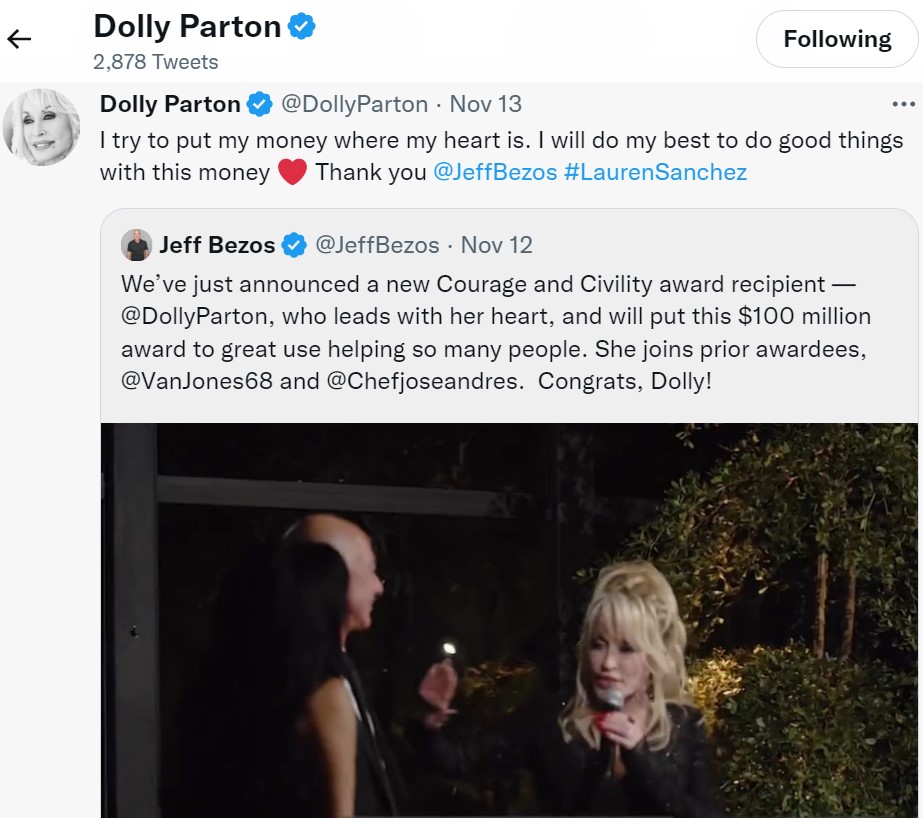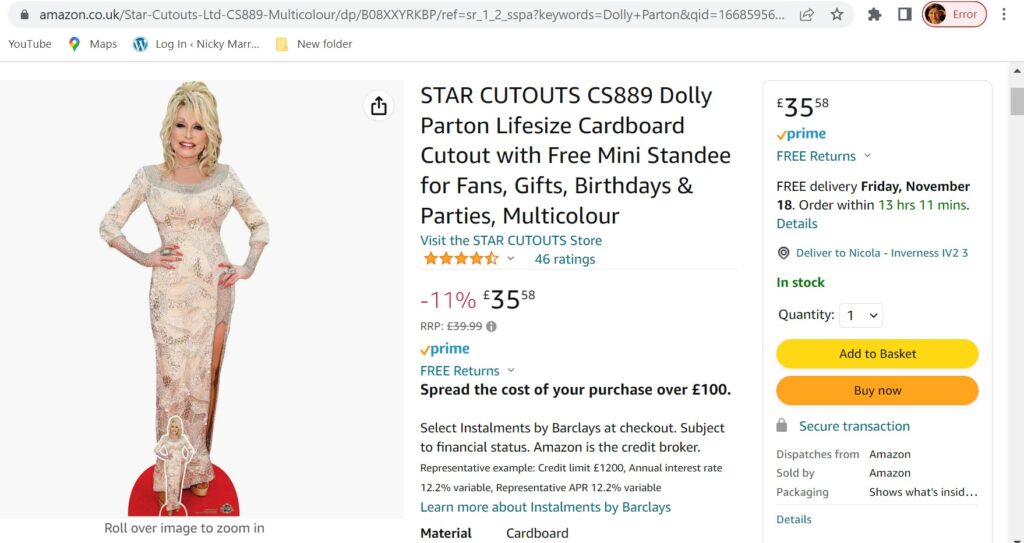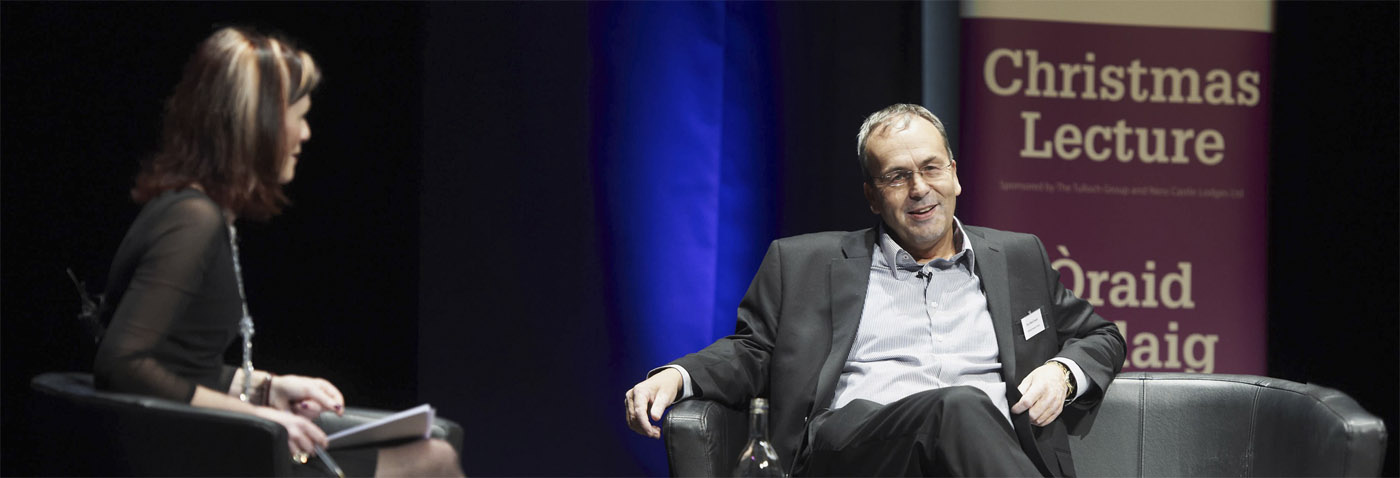On Monday morning, Dolly Parton was trending on Twitter, and that cold pang of fear struck – surely the Queen of Country hadn’t died?

Dolly Parton accepting $100million from Jeff Bezos at the weekend
But no – phew. Her name was in the news because Jeff Bezos, founder of Amazon, had donated $100 million to her, while anointing her with his Bezos Courage & Civility Award, which recognises leaders who “pursue solutions with courage and civility”.
The cash isn’t for Parton to splash out on another ‘Coat of Many Colours’, but for her to spend on the charities and charitable projects of her choice. As well as being an undeniably fabulous songwriter (I won’t hear a word against her) Dolly is a passionate campaigner for worldwide child literacy through her own Dollywood Foundation.
But the news story, while good overall, leaves me feeling uneasy.
Why do I feel uneasy?
Bezos is one of the richest people on the planet, his fortune having come from the rise, and rise of Amazon. Of course, his $100million to Dolly will change lives, and Dolly seems delighted. But it’s a drop in the ocean of his wealth. Bezos has since– under pressure – agreed that he will give away ‘most’ of his $127billion fortune during his lifetime.
Here’s my unease. How can we (and I accept my part in this ghastly situation) have allowed him – and the other tech giants like him – to have amassed such vast wealth? Shouldn’t we be trying to flatten the curve, through insisting on proper taxation of these huge multi-national corporations, at the same time as we insist on better wages and working conditions for Amazon staff?
Maybe then there would be less need for these hyper-rich entrepreneurs at the top of the pile to flamboyantly redistribute a fraction of the wealth they have earned at the expense of others. I’m sure Dolly Parton is sharp enough, but I can’t help but feel Bezos is riding on her good reputation.
Our systems allowed them to get obscenely wealthy
Why do we applaud the drop-in-the-ocean philanthropy of Bezos, Gates, and Buffet, when our flawed taxation systems helped them become so rich in the first place?
I’m not against people doing well if they come up with a great idea, work hard to bring that idea to market, and work fairly to ensure that those who work for them also benefit. I’m not opposed to entrepreneurship and success, but that success should be taxed in the same way as the rest of us are taxed – the more we earn, the more we pay. And that’s not what Amazon is famous for.
I admit it – with Amazon, we’re ‘in with the bricks’

Worryingly, Amazon is ‘listening’ – it has suggested I might like a lifesize Dolly cutout. It might not be wrong…
Amazon was founded in 1994 as an online bookshop, and is now the biggest retailer in the world, outside China. And as a family, I have to admit that we are in with the bricks. I have a Prime Account, meaning pretty well anything I want, or need, could arrive at my door tomorrow.
Amazon Firesticks dangle from the back of almost every telly in the house, giving us access to more hours of film and drama than I could watch in my lifetime – it’s how we watched the All Blacks sneak their win against Scotland at Murrayfield on Sunday.
And Amazon-owned Audible audiobooks keep me company while I walk, drive, and clean the house. They soothe me to sleep at night.
Could I live without Amazon? Of course. But do I want to? No.
We’re all complicit
I like the convenience and the entertainment, and I appreciate the lower prices. I needed a new hand-held mixer recently. In store locally it cost £27.99. The same model was delivered the next day for £13.99. And there’s the problem.
Amazon can only afford those cut prices because we’re all complicit – we’ve all seen the documentaries about warehouse workers being exploited. We’ve read the newspaper articles about delivery drivers working 12-hour days being barely able to make ends meet. And we know that we haven’t a clue how much corporation tax Amazon pays in the UK – if any – because their finances remain hidden, and no-one in government holds them to account.
The earning gap between top and bottom is obscene
I can’t deny that Bezos came up with a tremendous idea. But it is obscene that any one person should be that rich. The earning gap between those at the top and bottom of too many corporations has stretched beyond any concept of decent.
As I write, Jeremy Hunt is apparently re-considering a windfall tax on energy companies. Can I suggest Amazon is next on his list? I’m ready to pay more for my next food-mixer, and Dolly Parton CD, to achieve a slightly more even societal balance.
This column is published by Highland News and Media in newspapers across the north of Scotland. If you can, please support print media and the future of independent journalism by buying a paper, or subscribing online.
If you’d like to receive it by email every week, sign up free. Just pop your email address into the widget on my home page here. And feel free to share!



